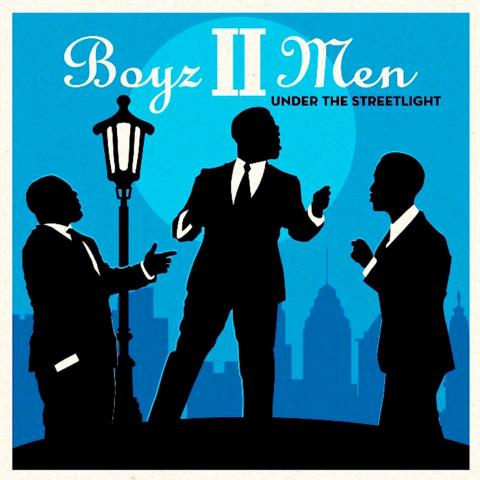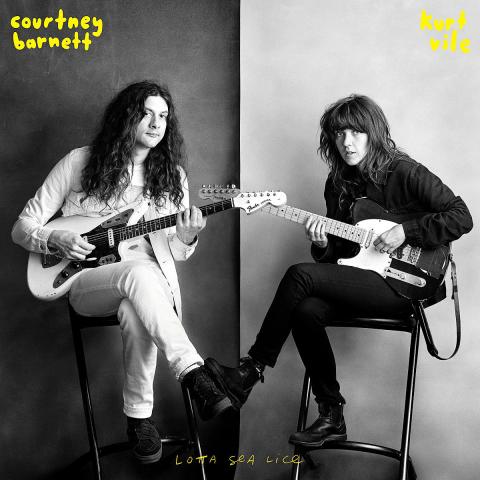Under the Streetlight
Boyz II Men
Sony Masterworks

The guys who gave us Motownphilly in 1991 are making fun of themselves these days in a Geico ad in which they harmonize gross digestive side effects at a pharmacy.
“If you’re Boyz II Men, you make anything sound good,” says the announcer. On a new CD, they also prove they can make already good songs sound very good indeed.
On Under the Streetlight, the Boyz — Nathan Morris, Shawn Stockman and Wanya Morris — tackle covers of classic tunes by the likes of Carole King, Sam Cooke and Randy Newman.

This is dangerous territory in the wrong hands — perhaps demanding a pharmacy visit of your own when it fails — but Under the Streetlight manages to give each song the Boyz’ soulful barbershop quartet treatment with respect and admiration for the originals, especially with a superb version of Why Do Fools Fall in Love.
The trio also gets terrific assists from Brian McKnight on I’ll Come Running Back To You, Tears on My Pillow and A Sunday Kind of Love. Amber Riley is a welcome, sultry addition to Anyone Who Knows What Love Is and Take 6 joins the trio on A Thousand Miles Away.
Boyz II Men mined the tradition of Motown boy groups like The Temptations and The Four Tops and evolved it, helping anchor the sound of new jack swing. They’ve reached back to an earlier time with their finger-snapping harmonies on Under the Streetlight. There’s even a welcome, new edition — the original song Ladies Man, which is a slice of multiharmony sunshine. The Boyz may be all grown up but their skills clearly haven’t been lost.

Lotta Sea Lice
Courtney Barnett & Kurt Vile
Matador Records
Courtney Barnett and Kurt Vile get together for an indie-pop guitar fest on Lotta Sea Lice, a low-key, deceptively effortless-sounding intercontinental collaboration.
Recorded over eight days spread across 15 months, the songs blend the individual styles of Australia’s Barnett and Vile, from Pennsylvania, despite the lack of officially shared writing credits.
The mood is laid back without fully slacking. While the singing, even in Barnett’s case, may contain a higher quotient of Vile’s drawl — which sometimes approximates the late Leon Russell or World Party’s Karl Wallinger — it’s that little pinch of sweetness in Barnett’s voice that really makes the songs gel.
The relaxed-but-bubbly attitude arrives fully formed already on the opening track, Over Everything, while Fear Is Like a Forest is the first of several tunes where Neil Young’s influence rears its swirling, slightly distorted head.
They also cover each other’s songs. Vile sings lead on Out of the Woodwork, from a Barrett EP, which includes lines like “It must be tiring trying so hard / To look like you’re not really trying at all” and “I guess if you’re afraid of aiming too high / Then you’re not really gonna have too far to fall.”
Barnett chooses Peepin’ Tom, one of the first Vile songs she heard, and whose dichotomies such as “I don’t wanna work, but I don’t wanna sit around all day frownin’ / I don’t wanna give up, but I kinda wanna lie down but not sleep, just rest” sound like slogans for the whole album, which wraps up with a heartbreakingly languid version of Belly’s Untogether. Lotta Sea Lice is like a conversation between best friends whose words just happen to overlap.
Carry Fire
Robert Plant
Nonesuch/Warner Bros
One of the weirder chapters in rock history happened in 2014. That’s when Led Zeppelin won a Grammy for best rock album for a seven-year-old concert recording while the band’s former frontman Robert Plant somehow didn’t even scrounge up a nomination for easily one of the best albums of the year.
Three years later, let’s hope the future doesn’t again get overshadowed by the past.
The 11-track Carry Fire finds Plant backed by his talented band, The Sensational Space Shifters, and thrillingly exploring the same fascinating terrain of rootsy folk and achy blues.
If 2014’s Lullaby and the Ceaseless Roar seemed very personal and soaked in heartbreak, the new album has Plant in a somewhat happier place and looking to the horizon, perhaps becoming more political.
New World is a bitter look at the way we treat immigrants, Carving Up the World Again mocks border walls and Bones of a Saint coolly dispatches religious fervor. He pushes deeper than ever into Middle Eastern sounds with the outstanding oud-filled title track, an exhilarating multicultural triumph.
Of course, no one does love like Plant — mature, earthy and world-weary. Here, he seems to have found a new spark — “Lay down in sweet surrender / Your love so warm and tender,” he sings in the opening song. On another, the standout A Way With Words, he sings: “Coming from the cold / Reaching for your sweet embrace.”
As with his last album, there are coy nods to his past, like the title of the first song, the strummy anthem May Queen, which Zeppelin fans will instantly recognize from Stairway to Heaven. He sings about “dancing days” here, which is also the title of a song on 1973’s Houses of the Holy. There’s an intimacy to Plant’s weathered voice throughout, so intimate in fact that it sometimes feels as if we’re intruding on a very personal moment. He’s also using more modern technology to create an album that seamlessly mixes cello, bendir and Moog synthesizer, backed by the accomplished musicians John Baggott, Justin Adams, Billy Fuller, Dave Smith and Liam “Skin” Tyson.
If anyone still needs proof of the skills on offer here, look no further than the cover of Ersel Hickey’s Bluebirds Over the Mountain, a rockabilly ditty from the `50s of no special importance. Plant and his band — joined by Chrissie Hynde — give it a dark synth texture and menacing guitar, making it closer to a David Bowie tune.
There are few undisputed rock stars this accomplished still taking musical risks. Plant’s songwriting remains a class above, even as he nears 70. “Out here the fire’s still burning / So long into my night,” he sings. Long may it burn.

In the March 9 edition of the Taipei Times a piece by Ninon Godefroy ran with the headine “The quiet, gentle rhythm of Taiwan.” It started with the line “Taiwan is a small, humble place. There is no Eiffel Tower, no pyramids — no singular attraction that draws the world’s attention.” I laughed out loud at that. This was out of no disrespect for the author or the piece, which made some interesting analogies and good points about how both Din Tai Fung’s and Taiwan Semiconductor Manufacturing Co’s (TSMC, 台積電) meticulous attention to detail and quality are not quite up to

April 21 to April 27 Hsieh Er’s (謝娥) political fortunes were rising fast after she got out of jail and joined the Chinese Nationalist Party (KMT) in December 1945. Not only did she hold key positions in various committees, she was elected the only woman on the Taipei City Council and headed to Nanjing in 1946 as the sole Taiwanese female representative to the National Constituent Assembly. With the support of first lady Soong May-ling (宋美齡), she started the Taipei Women’s Association and Taiwan Provincial Women’s Association, where she

Chinese Nationalist Party (KMT) Chairman Eric Chu (朱立倫) hatched a bold plan to charge forward and seize the initiative when he held a protest in front of the Taipei City Prosecutors’ Office. Though risky, because illegal, its success would help tackle at least six problems facing both himself and the KMT. What he did not see coming was Taipei Mayor Chiang Wan-an (將萬安) tripping him up out of the gate. In spite of Chu being the most consequential and successful KMT chairman since the early 2010s — arguably saving the party from financial ruin and restoring its electoral viability —

It is one of the more remarkable facts of Taiwan history that it was never occupied or claimed by any of the numerous kingdoms of southern China — Han or otherwise — that lay just across the water from it. None of their brilliant ministers ever discovered that Taiwan was a “core interest” of the state whose annexation was “inevitable.” As Paul Kua notes in an excellent monograph laying out how the Portuguese gave Taiwan the name “Formosa,” the first Europeans to express an interest in occupying Taiwan were the Spanish. Tonio Andrade in his seminal work, How Taiwan Became Chinese,